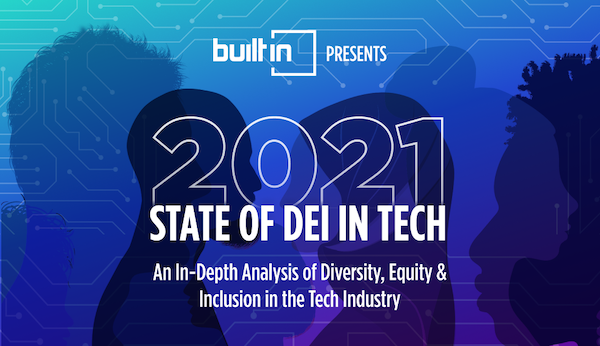Built In’s most recent webinar focused on the topic of diversity, equity and inclusion in tech, highlighting both the areas where progress has been made, as well as those where the tech industry misses the mark. The conversation coincided with the release of our latest report, 2021 State of DEI in Tech. Built In’s very own Catalina Colman, Director of HR & Inclusion, led a panel of DEI leaders from three notable tech companies.
The conversation revealed the exciting work that these employers are doing to build a strong, welcoming environment that empowers every individual to reach their full potential and thrive. In this article, we highlight key takeaways from the discussion. Download the on-demand webinar to access the full-length recording of the webinar.
ON-DEMAND WEBINAR: THE STATE OF DEI IN TECH. DOWNLOAD NOW.
1. Tech professionals seek out DEI-invested employers, so you must highlight your efforts.
According to our data, 78 percent of all tech professionals and 88 percent of Black tech professionals think DEI is very important when considering an opportunity. Sonja Gittens Ottley, Head of Diversity & Inclusion at Asana, said this stat acknowledges two things for BIPOC candidates: first, this is core to their identity and they want to work at a company where they feel valued. Second, they know that they have a choice and can find a company that values DEI as much as they do.
“It’s about ensuring that you're not just talking about it and saying this is something you do, but that your actions show this work,” said Gittens Ottley. “We do that in a couple of ways, some ways visible to candidates, whether it's by asking for pronouns or encouraging people to share their pronouns, or having an inclusive hiring process.”
Gittens Ottley added that it’s also important to highlight the strategies and efforts happening behind the scenes — and which are not visible throughout the hiring process — with candidates. As an example, Gittens Ottley discussed Asana’s bias training initiative: “We train managers and anyone involved in the hiring process on bias because we believe bias is one of the foundational things we need to be addressing.”

2. Reporting on DEI metrics is essential.
Our survey of tech professionals also found that 60 percent look for data on DEI when researching potential employers, emphasizing the importance of reporting on key diversity, equity and inclusion metrics.
Not only is this a critical recruitment tactic, explained Chante Butler, Head of Diversity and Inclusion at Flatiron Health, it’s also essential to adequately serve current employees and improve retention. “As we're on our DEI journey and ever evolving, it's really important to be accountable to our employees,” said Butler. “Reporting helps to hold us accountable — to our employees and to ourselves — and also helps us to really provide transparency to our employees and show our commitment through our data.”
Butler also added that reporting is essential to identifying areas for improvement and making informed decisions on how to shift your DEI strategy. “We're really trying to focus our DEI program to be data driven and data responsive, to ensure that we're doing the best for our employees and doing the best for Flatiron as a whole.”
3. Equity is not equality.
It’s easy to want to hit the ground running immediately following the realization that creating a culture founded on DEI is so important. However, it’s crucial to remember that equity is not the same as equality, and to take the time to address pre-existing inequities.
“I think what's super important here is recognizing that the gaps exist,” said Amaia Arruabarrena, Senior Manager of Diversity, Equity, & Inclusion at ezCater. Arruabarrena explained that companies often jump to implementing new processes and ensure that resources are available to employees without recognizing the history of inequities marginalized and underrepresented individuals face.
Arruabarrena added: “To really do this work the right way, we need to acknowledge what has happened before these individuals were employees of the company, acknowledge the systemic racism that exists, and acknowledge the inequities that exist throughout the lifecycle that is living in the United States, and address them specifically.”
These are just a few examples of the data and insights shared during the State of DEI webinar. To hear the entire conversation, download the full-length recording now.
ON-DEMAND WEBINAR: THE STATE OF DEI IN TECH. DOWNLOAD NOW.




